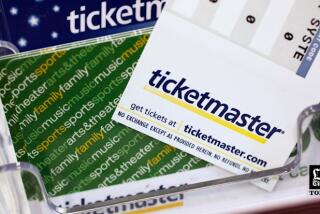Hidden Contract Rules Catch One-Way Fliers
- Share via
You can pay for a bottle of beer and drink half, if you choose. You can pay for two nights in a hotel and stay one, if you like. You can pay for a round-trip Greyhound ticket to Phoenix, then stay there (although, in the sensible world of bus travel, a one-way ticket is cheaper). But try to use half of a round-trip airline ticket and alarms start ringing.
That’s what has happened to Derek and Ileen Gribble of Corona, in Riverside County, and their 15-year-old twin sons.
Around April 1, the family bought tickets on Northwest Airlines for a June trip to Grand Rapids, Mich. In late April, the Gribbles learned that the twins, Edward and Tom, had made it to the next level in a nationwide school trade-skills competition. This was good news, but it meant the Gribbles needed to add Kansas City, Mo., the site of the finals, to the boys’ itinerary.
The change in plans has put them in the middle of a perplexing tangle. The problem is not how to pay for the boys’ flights from Los Angeles to Kansas City and from Kansas City to Grand Rapids; the Gribbles and their school were ready for that. The problem is that, in order to return the boys to LAX from Grand Rapids, the family hoped to use just the return part of the round-trip Los Angeles-Grand Rapids tickets they had already purchased.
Northwest Airlines policy forbids this. Airline policy says that, instead, the family should cancel the round-trip booking and rebook one-way tickets home (which can be much costlier).
Their case is further complicated because the Gribbles bought their original tickets at a discount through the online agency Hotwire.com, which barred exchanges. So the Gribbles can’t trade in their round-trip tickets for a fee of $75 or $100 per traveler, as they could with tickets bought through an old-fashioned travel agent or directly from the airline. They would have to absorb the cost of the round-trip tickets and buy new one-way tickets, which would add $1,000 or more to the cost of a trip beyond the added air fares to and from Kansas City.
The central question is this: How can an airline sell you a round-trip ticket and forbid you to use only half? It seems unfair and illogical to Derek Gribble that Northwest attaches such strings. “If they’ve sold the seat at a price they’re happy to sell it for, what are they losing?” he asks.
On this issue, Northwest is marching in step with the nine other largest carriers in the U.S. In the post-deregulation scramble to extract maximum revenue from every seat, the major carriers have adopted fare systems designed to separate deep-pocketed business travelers from thriftier leisure travelers. Hence these systems routinely demand more money for a one-way ticket than for a round-trip ticket and more money for a round trip without a Saturday stay than for a round trip with a Saturday stay.
How much more money? I tested some LAX-to-New York coach-class fares recently using an online travel agency, giving May 16 as the departure date for a 21-day advance purchase fare. The best round-trip fare with a Saturday stay-over was $309 on American, Delta and United, the three largest U.S. carriers. The best round-trip fare for a three-day trip, no Saturday stay, was $599 on American, $1,148 on Delta, $2,257 on United. For a one-way May 16 flight, it was $1,128 on American, $1,059 on Delta, $1,128 on United. By the time you read this, these fares may have fluctuated, but the trend is clear: Stray from the round-trip, Saturday-stay path and you pay dearly.
Unless you find a loophole. The practice of using half of a round-trip ticket, known as “throwaway ticketing,” is a cousin of the similarly controversial “back-to-back ticketing,” in which a traveler avoids Saturday-night stay requirements by booking two round-trip tickets and using half of each.
To keep travelers from sidestepping higher fares, the airlines have imposed detailed rules. You won’t find them on your ticket, and nobody will explain them when you buy the ticket, but they’re collectively known as a “contract of carriage,” and if you buy a ticket, the airline presumes you are agreeing to that contract.
So what happens to contract violators? If airlines catch a travel agent making throwaway or back-to-back bookings, they often send “debit memos” (essentially demanding that travel agents pay them back to make up for the revenue they lost) or they stop doing business with the agent. And sometimes, says James Peppe, airline analyst for the Web site OneTravel.com, airlines threaten to deny boarding to travelers who are habitual throwaway bookers.
‘We do advise travelers that, even though [throwaway ticketing] is tempting, be safe and don’t do it,” Peppe says.
The rhetoric on this subject can be thick from both sides. Airline representatives have said that ignoring such restrictions is as immoral as stealing.
But many consumer advocates, like Internet travel columnist Christopher Elliott and travel agent and author Gary Schmidt, contend that such loopholes are a legitimate money-saving strategy in a vicious marketplace, no less moral than an airline neglecting to record your frequent-flier mileage or failing to offer Internet discounts to telephone customers.
Scott W. Reed, a spokesman for the Washington-based National Airline Passengers Coalition, which lobbies for air travelers, argues that “if you buy it, you should be able to use it. It’s about time the airlines showed some sensitivity toward travelers.... It’s all reaching a boiling point.”
With the Gribbles and Northwest, the conversation did not reach that point. “We would encourage the customers to contact our customer service department,” says Northwest spokeswoman Mary Beth Schubert. “We know that from time to time exceptions might have to be made to policies, depending on the circumstances.”
This apparently was not one of those times, Ileen Gribble says. A representative told her the airline could not make an exception.
The Gribbles thought about showing up at the airport and hoping that Northwest didn’t block the boys from boarding. Instead the family has worked out a deal with the school that involves buying new round-trip tickets to Grand Rapids for the boys, with stopovers in Kansas City. The Gribbles will pay the difference between a round trip to Kansas City and a round trip to Grand Rapids, which comes out to about $320 for both boys. The boys will fly home on the same flight on which they were originally scheduled and for which they hold tickets they now can’t use.
*
Christopher Reynolds welcomes suggestions but cannot respond individually to letters and calls. Address comments to Travel Insider, The Times, 202 W. 1st St., Los Angeles, CA 90012, or send e-mail to chris.reynolds@latimes.com.
More to Read
Sign up for The Wild
We’ll help you find the best places to hike, bike and run, as well as the perfect silent spots for meditation and yoga.
You may occasionally receive promotional content from the Los Angeles Times.







